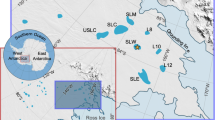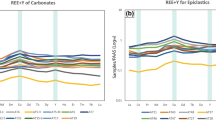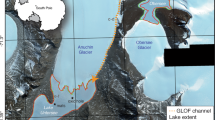Abstract
No published reports exist on the early stages in the establishment and succession of microbial communities and associated chemical and geochemical transformations in aquatic environments shortly after a volcanic event. Much of our understanding of volcanic lakes has come from studies carried out years to centuries after the eruption, when the lakes were already stabilized. Here we document the chemical and microbiological responses of lakes and hydrothermal environments in the blast zone near Mt St Helens 3–4 months after the eruption of 18 May 1980. Within weeks of the eruption, the impacted lakes became anaerobic, ultraeutrophic and developed extensive populations of bacteria, some of which were not common to those environments. By August 1980 both assimilative and dissimilative nitrogen cycle reactions were regulating the extent of chemosynthetic, photosynthetic and heterotrophic activities occurring in the lakes. Recovery of the lakes to their normal oligotrophic state will result in part from oxygen production by photosynthesis and anaerobic oxidation of reduced metals, gases and organic compounds coupled with denitrification.
This is a preview of subscription content, access via your institution
Access options
Subscribe to this journal
Receive 51 print issues and online access
$199.00 per year
only $3.90 per issue
Buy this article
- Purchase on Springer Link
- Instant access to full article PDF
Prices may be subject to local taxes which are calculated during checkout
Similar content being viewed by others
References
Fruchter, J. S. et al. Science 209, 1116–1125 (1980).
Hooper, P. R., Herrick, I. W., Laskowski, E. R. & Knowles, C. R. Science 209, 1125–1126 (1980).
Cook, R. J., Barron, J. C., Papendick, R. I. & Williams, G. J. III, Science 211, 16–22 (1981).
Triska, F. J., Sedell, J. R. & Buckley, B. M. Verh. int. Ver. Limnol. 19, 1628–1639 (1975).
Buckley, B. M. & Triska, F. J. Verh. int. Ver. Limnol. 20, 1333–1339 (1978).
Brezonik, P. L. & Harper, C. L. Science 164, 1277–1279 (1969).
Marxsen, J. Arch. Hydrobiol. Suppl 58, 26–55 (1980).
Jones, K. J. Ecol. 62, 553–565 (1974).
Goering, J. J. in Microbiology-1978 (ed. Schlessinger, O.) 357–361 (American Society for Microbiology, Washington DC, 1978).
Oremland, R. S. & Taylor, B. F. Geochim. cosmochim. Acta 42, 209–214 (1978).
Rudd, J. W. M. & Hamilton, R. D. Limnol. Oceanogr. 23, 337–348 (1978).
Froelich, P. N. et al. Geochim. cosmochim. Acta 43, 1075–1090 (1979).
Hill, A. R. Nature 281, 291–292 (1979).
Dicker, H. J. & Smith, D. W. Appl. envir. Microbiol. 39, 1019–1025 (1980).
Haines, J. R., Atlas, R. M., Griffiths, R. P. & Morita, R. Y. Appl. envir. Microbiol. 41, 412–421 (1981).
Carpenter, J. M. Limnol. Oceanogr. 10, 141–153 (1965).
Driscoll, J. N., Atwood, E. S., Fowler, J. E. & Selig, W. Ind. Res. Dev. August, 91–94 (1980).
Murray, J. W. & Gill, G. Geochim. cosmochim. Acta 42, 9–19 (1978).
Morgan, J. J. & Stumm, J. J. Am. Wat. Wks Ass. 47, 107–119 (1965).
Strickland, J. D. H. & Parson, T. R. A Practical Handbook of Seawater Analysis 121–138 (Bulletin Fisheries Research Board, Canada, 1972).
Menzel, D. W. & Corwin, N. Limnol. Oceanogr. 10, 280–282 (1965).
Menzel, D. W. & Vaccaro, R. F. Limnol. Oceanogr. 9, 138–142 (1964).
Cohen, Y. Analyt. Chem. 49, 1238–1240 (1977).
Swinnerton, J. W. & Linnenbom, N. J. J. chromatogr. Sci. 5, 570–573 (1967).
Zimmerman, R. & Meyer-Reil, L. A., Kieler Meeresforsch 30, 24–27 (1974).
Rippka, R., Deruelles, J., Waterbury, J. B., Herdman, M. & Stanier, R. Y. J. gen. Microbiol. 111, 1–61 (1979).
Nealson, K. H. & Ford, J. Geomicrobiology 2, 21–37 (1980).
Stewart, W. D. P., Fitzgerald, G. P. & Burris, R. H. Proc. natn. Acad. Sci. U.S.A. 58, 2071–2078 (1967).
Knowles, R. Appl. envir. Microbiol. 38, 486–493 (1979).
Belser, L. W. & Mays, E. L. Appl. envir. Microbiol. 39, 505–510 (1980).
Hardy, R. W. F., Burns, R. C. & Holsten, R. D. Soil Biol. Biochem. 5, 47–81 (1973).
Potts, M., Krumbein, W. E. & Metzger, J. in Environmental Biogeochemistry and Geomicrobiology (ed. Krumbein, W. E.) 753–769 (Ann Arbor Science, 1978).
Author information
Authors and Affiliations
Rights and permissions
About this article
Cite this article
Baross, J., Dahm, C., Ward, A. et al. Initial microbiological response in lakes to the Mt St Helens eruption. Nature 296, 49–52 (1982). https://doi.org/10.1038/296049a0
Received:
Accepted:
Issue Date:
DOI: https://doi.org/10.1038/296049a0
This article is cited by
-
Responses of testate amoebae assemblages (Amoebozoa: Arcellinida) to recent volcanic eruptions, inferred from the sediment record in Laguna Verde, southern Patagonia, Argentina
Journal of Paleolimnology (2022)
-
Aquatic community response to volcanic eruptions on the Ecuadorian Andean flank: evidence from the palaeoecological record
Journal of Paleolimnology (2017)
-
A geochemical method for removing the effect of tephra on lake diatom oxygen isotope records
Journal of Paleolimnology (2007)
-
Late-glacial pollen and diatom changes in response to two different environmental perturbations: volcanic eruption and Younger Dryas cooling
Journal of Paleolimnology (1995)
-
Bacteria, fungi and biokarst in Lechuguilla Cave, Carlsbad Caverns National Park, New Mexico
Environmental Geology (1995)
Comments
By submitting a comment you agree to abide by our Terms and Community Guidelines. If you find something abusive or that does not comply with our terms or guidelines please flag it as inappropriate.



